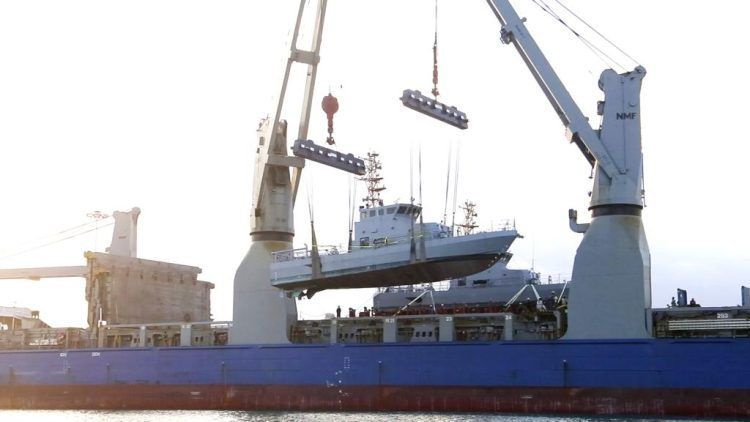The Ghana Navy has received two high-speed Protector class ships from the United States of America to boost its maritime law enforcement mandate.
The two high-speed Protector class ships arrived at the Takoradi Harbor onboard the Ocean Giant vessel, and each came with a boat and has a maximum speed of 25 knots. The boundary class ship has a length of 27 meters, a breadth of 5.9 meters, and a draught of 1.7 meters.
At the delivery of the two class ships at the Takoradi Harbor, the Flag-Officer Commanding the Western Naval Command, Commodore Emmanuel Kwafo, said the vessels’ arrival will add to their capacity to fight against armed robbery at sea, piracy, illegal bunkering, drug and human trafficking, and protection of Ghana’s fisheries resources.
Commodore Emmanuel Kwafo, while thanking the U.S. government for the vessels, said this will enhance security at the far West and East of Ghana’s marine space.
“We are going to name one of the vessels GNS AFLAO and the other GNS HALF ASSINI. We are going to use them out there, and because of their endurance, they are very fast and very economical. With just about 12 personnel to man it, it could be at sea for about three days, and so they are a very good addition to our inventory. I wish to express our sincere gratitude to the government and people of the U.S. for this kind gesture,” he said.
The U.S. Naval Attaché to Ghana, Commander Carlton McClain, who handed over the two class ships to Ghana on behalf of the U.S., said Ghana’s Navy plays a critical role in maritime security in the Gulf of Guinea, and hence the vessels are to strengthen Ghana’s regional maritime security and defense capabilities.
“Ghana is our most important partner, especially in regional security for the Gulf of Guinea and for West Africa. The Gulf of Guinea is important in terms of trade, and we are happy to assist Ghana in this partnership,” he said.
The Marine Protector class is 27 metres long, with a displacement of over 90 tons. Two MTU diesel engines give a top speed of 25 knots (46 km/h) and range of 1 700 km and endurance of three days. Complement is ten personnel. Armament includes two 12.7 mm machineguns. Boarding parties can be launched while the vessel is underway, through a stern launching ramp; Ghana received two rigid-hull inflatable boats (RHIBS) along with the two patrol boats.
Since the early last decade, Ghana has been steadily building its naval strength, by introducing new vessels and building a new base.
Last year, the Ghanaian Navy (GN) commissioned four new Flex fighter patrol boats, and is awaiting the delivery of two other offshore patrol vessels.
Currently, the Navy of Ghana has a total of 11 ships including four Snake-class patrol vessels, two Balsam-class patrol ships, one Chamsuri-class patrol boat, two Albatros-class fast attack craft, and two Warrior-class/Gepard-class fast attack craft.
Also, soon the United States’ SAFE Boats International will supply two 38-foot (12 m) Defender class boats along with trailers, spare parts, and training to the Ghanaian Navy to help in the fight against piracy and other maritime crime.
In 2017, China donated four patrol boats to the Ghanaian navy as part of a $7.5 million military assistance package to Ghana to enhance the military cooperation between the two countries.
In the area of training, Ghana’s elite special operations force; the Special Boat Squadron (SBS) recently graduated its first batch of operators who were trained in the country.
Eight new special boat operators completed the rigorous six-month course and were the only ones out of a class of 25 to successfully finish and receive special forces badge.
They trained at the Naval Training Command in Nutekpor which was opened two years earlier. They will now join the SBS, an elite special forces unit trained to counter piracy and trafficking and conduct opposed boarding of ships.


